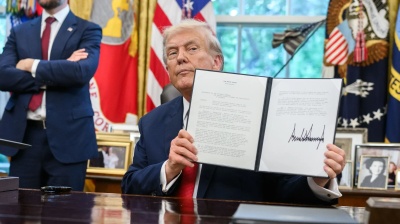Since the onset of the war Russia has severely crippled Ukraine's electricity generation capability, destroying over 60% of the nation's energy production capacity. This has reduced Ukraine's generation from 55 GW to a mere 20 GW, according to Ukrainian officials. One anonymous official reportedly told the FT that Ukrainians should prepare for "life in the cold and the dark" this winter.
The most recent Russian missile attacks have further compounded the damage, eliminating 9.2 GW of capacity since March 2024 alone. The June 1 bombing was particularly devastating, causing the loss of 1.2 GW of generation and inflicting severe damage on critical infrastructure, including the gas transportation system essential for underground storage facilities in western Ukraine. This damage threatens not only domestic energy supply but also gas exports to the EU.
According to Ukrainian Energy Minister German Galushchenko, the country is in the midst of an energy crisis. In his turn, Mikhail Podolyak, adviser to the head of the Ukrainian presidential office, specified that the Kanevskaya HPP, the Dnieper Hydroelectric Station and the Zmiyevskaya TPP had been damaged.
The Energy Ministry reported the complete destruction of the Tripolskaya TPP, the largest power-generating facility in the Kiev Region. According to Ukrainian Foreign Minister Dmitry Kuleba, over half of the country's entire energy system has been damaged.
In response, Ukrainian energy companies have implemented scheduled blackouts to limit electricity consumption. As of June 6, emergency outages have been imposed in 12 oblasts: Kharkiv, Sumy, Kyiv, Cherkasy, Chernihiv, Ivano-Frankivsk, Rivne, Volyn, Lviv, Odesa, Zaporizhzhia and Kirovohrad. Ukrenergo, the national power company, initiated these measures after consumption limits were exceeded on June 5.
Ukraine's energy sector has a total capacity of approximately 53 GW, with about half (28 GW) derived from thermal power plants (TPPs). The remainder of the capacity comes from nuclear and renewable sources, which have largely escaped Russian attacks so far.
That might be just about to change. The director of Ukraine’s biggest power company DTEK Dmytro Sakharuk reported during the KIEF Talks that since June 1 the Russians have begun to strike Ukrainian solar power plants and destroyed the distribution equipment at several large solar power plants, UBN reports.
In an effort to mitigate the impact of ongoing missile attacks, the Ministry of Economy is working with partners from the European Bank for Reconstruction and Development (EBRD) and the European Investment Bank (EIB) to secure funds through the Ukraine Facility to restore the energy sector.
Prime Minister Denys Shmyhal announced that the EBRD will provide €300mn to restore energy infrastructure and construct new decentralised generation facilities. This forms part of a broader initiative, with the EBRD having committed €4bn to Ukraine since the start of the full-scale Russian invasion. "This support will help to fulfil our goal – to ensure a stable and uninterrupted electricity supply to the entire territory of Ukraine," Shmyhal stated. He also noted that the long-term consequences of Russian attacks on energy infrastructure would necessitate electricity conservation measures for years to come.
In addition to international support, Ukraine has increased consumer electricity tariffs to generate additional revenue for state energy companies Energoatom and Ukrhydroenergo. Analysts estimate that the increase will yield an extra UAH50bn ($1.2bn) in 2024. Energoatom plans to use these funds to reduce its obligatory consumer price subsidies and increase profit, while Ukrhydroenergo will direct the additional revenue towards restoring damaged hydroelectric plants and constructing new nuclear power units.
The government raised the consumer electricity price to UAH4.32 ($.11) per kWh, a necessary move to restore the damaged state power generation network. For comparison, the average household electricity tariff in the EU at the end of 2023 was €0.2226 per kWh, or UAH9.39.
Meanwhile, Ukraine’s Energy Ministry has disputed the claims made in the June 5 FT article about the extent of the damage to Ukraine’s energy infrastructure, accusing the FT of aiming to "spread fear and panic" among the population and pandering to Russian propaganda points.
News

Ghana’s dormant TOR refinery to restart crude operations by October-end
Ghana has long struggled to translate its crude output into refined fuel security. Successive governments have pledged to revive TOR, which has faced years of debt, mismanagement, and technical breakdowns.

No Tomahawks for Ukraine, Trump to meet Putin in Hungary
The US cannot deplete its own stockpile of Tomahawk cruise missiles by supplying them to Ukraine, President Donald Trump said at a press conference on October 16 following a phone conversation with Russian President Vladimir Putin.

Bangladesh seeks death penalty for former Prime Minister Hasina
Bangladesh’s interim administration led by Nobel laureate Muhammad Yunus has requested the country’s criminal tribunal impose the death penalty on former Prime Minister Sheikh Hasina

US ambassador thanks Turkey for role in "coordinated squeeze" that forced Hamas to surrender
Ankara, Cairo and Doha took part in tactics that made Palestinian group accept deal it did not want.



